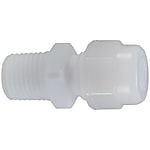(!)NOTE : Windows 7 users won’t be able to use some latest features of eCatalog/WOS since Microsoft is ending support for Windows 7 on 14 Jan, 2020. Please upgrade your system for uninterrupted services.
- Notice of End of Sales for Economy Series Pneumatic Equipment Category. More information.
Fitting(Thread-to-Pipe Connection Type:Male Threaded Straight)
Brand |
|
|---|---|
| CAD |
|
| Days to Ship |
|
1 items
- Sort By
-
You can add up to 6 items per a category to the compare list.

Fluororesin Couplings - Male Connectors / Bore-Through Connectors
MISUMI
No special tools are required for tightening. An all-fluoropolymer fitting with high chemical resistance.
- Volume Discount
Connection Type Type Material Thread-to-Pipe Connection Type Pipe-to-Pipe Equal Dia. Connection Type Pipe-to-Pipe Unequal Dia. Connection Type Type of Related Component Applicable Tube Outer Dia. (mm) D (D1) Applicable Tube O.D. (mm) D2 Applicable Tube O.D. (inch) D (D1) Applicable Tube O.D. (inch) D2 Connection Screw Type M (M1) Connection Screw Nominal M (M1) Maximum Operating Temperature(°C) Thread <-> Tube joint body PTFE Male Threaded Straight - - - 4 ~ 10 - - - R 1/2B ~ 3/8B - From: ₹ 1,318.52 Days to Ship: 10 Day(s) or more  10 Day(s) or more
10 Day(s) or more
| Brand |
|---|
| Product Series |
| CAD |
| From |
| Days to Ship |
| Connection Type |
| Type |
| Material |
| Thread-to-Pipe Connection Type |
| Pipe-to-Pipe Equal Dia. Connection Type |
| Pipe-to-Pipe Unequal Dia. Connection Type |
| Type of Related Component |
| Applicable Tube Outer Dia. (mm) D (D1) |
| Applicable Tube O.D. (mm) D2 |
| Applicable Tube O.D. (inch) D (D1) |
| Applicable Tube O.D. (inch) D2 |
| Connection Screw Type M (M1) |
| Connection Screw Nominal M (M1) |
| Maximum Operating Temperature(°C) |
You can add up to 6 items per a category to the compare list. | |
| Brand | MISUMI |
| Product Series | Fluororesin Couplings - Male Connectors / Bore-Through Connectors |
| CAD |
|
| From | ₹ 1,318.52 |
| Days to Ship | 10 Day(s) or more |
| Connection Type | Thread <-> Tube |
| Type | joint body |
| Material | PTFE |
| Thread-to-Pipe Connection Type | Male Threaded Straight |
| Pipe-to-Pipe Equal Dia. Connection Type | - |
| Pipe-to-Pipe Unequal Dia. Connection Type | - |
| Type of Related Component | - |
| Applicable Tube Outer Dia. (mm) D (D1) | 4 ~ 10 |
| Applicable Tube O.D. (mm) D2 | - |
| Applicable Tube O.D. (inch) D (D1) | - |
| Applicable Tube O.D. (inch) D2 | - |
| Connection Screw Type M (M1) | R |
| Connection Screw Nominal M (M1) | 1/2B ~ 3/8B |
| Maximum Operating Temperature(°C) | - |
Loading...
Configure
Specification/Dimensions
-
Connection Type
- Thread <-> Tube
- Pipe <=> Pipe Equal Dia. Connection
- Pipe <=> Pipe Unequal Dia. Connection
-
Type
- joint body
- parts relating to
-
Material
- PTFE
- PFA
-
Thread-to-Pipe Connection Type
- Male Threaded Straight
- Male Threaded Elbow
- Threaded Straight (Barb)
-
Pipe-to-Pipe Equal Dia. Connection Type
- Union Straight
- Union Elbows
- Union Tees
-
Pipe-to-Pipe Unequal Dia. Connection Type
- Reducing Union
-
Type of Related Component
- Nuts
- Others
-
Applicable Tube Outer Dia. (mm) D (D1)
-
Applicable Tube O.D. (mm) D2
-
Applicable Tube O.D. (inch) D (D1)
-
Applicable Tube O.D. (inch) D2
-
Connection Screw Type M (M1)
-
Connection Screw Nominal M (M1)
-
Maximum Operating Temperature(°C)
Related Categories to Fitting
FAQ Fitting
- Question: How to choose the right fitting?
- Answer: The choice of fitting depends on factors such as: • Material compatibility: Ensure the fitting material matches or complements the pipe material. • Pressure requirements: Some materials and types of fittings handle higher pressures better than others. • Pipe size: Fittings must be compatible with the diameter of the pipes you are connecting. • Fluid or gas type: Certain materials are better suited for specific types of fluids or gases.
- Question: What materials are pipe fittings made from?
- Answer: Pipe fittings can be made from various materials such as PVC, CPVC, ABS, cast iron, steel, brass, and stainless steel, depending on the application and requirements.
- Question: What are some common problems with fittings?
- Answer: Common problems with fittings include: • Leaks: Leaks can occur due to loose connections, damaged gaskets, or corrosion. • Corrosion: Fittings made from certain materials may be susceptible to corrosion, especially if exposed to harsh environments. • Clogging: Fittings can become clogged with debris or sediment, restricting flow. • Fatigue: Fittings subjected to repeated stress may experience fatigue and failure.
- Question: What are the different types of fittings?
- Answer: There are many types of fittings, including: • Elbows: Used to change the direction of a pipe or tube. • Tees: Used to branch a pipe or tube into two directions. • Couplings: Used to connect two pipes or tubes of the same size and type. • Reducers: Used to reduce the size of a pipe or tube. • Caps: Used to seal the end of a pipe or tube. • Flanges: Used to connect pipes or tubes to other components, such as valves or pumps.





How can we improve?
How can we improve?
Thank you for your time.
Your feedback is essential for our continuous improvement
Privacy Policy
Thank you for your cooperation.
Thank you for your time.
Your feedback is essential for our continuous improvement
Please use the inquiry form.
Privacy Policy